Okay this one is completely off topic, but I figured it deserved a bit more than a Facebook update (boaties I will not be offended if you choose to sit this one out).
I am in a bit of a conundrum with the Hobbit.
Morally I should not want to have anything to do with it, but here I am getting caught up in the geeky, Gollumy, wizardy hype.
A bit of back-story for the non-Kiwi readers: Peter Jackson, the Hobbit’s director, was a bit of a folk hero for many of us – who spent our teenage years peering through our fingers, giggling hysterically at his B-grade splatter sci-fi monstrosities. We were horrified and enthralled by Meet the Feebles (you CAN’T do that with Muppets!), utterly grossed out by Brain Dead and Bad Taste and fascinated by the strange beauty of Heavenly Creatures.
Then our local boy went and done good – he and his Weta Workshop managed to land Lord of the Rings. They got to create some amazing critters, heaps of NZ actors and artists got exposure, the local movie scene took off and turning up to interviews barefoot became socially acceptable.
Fast-forward to 2010 when PJ broke my heart.
After many other film successes and a knighthood he managed to secure the Hobbit – and that was no mean feat (there is a whole other backstory there). More exposure for local actors, great opportunities for tourism providers – what’s not to be happy about?
Unfortunately Sir Peter then stuck it to the unions, denying actors minimum guarantees on wages and working conditions. He even spat the dummy and threatened to move the whole kit and caboodle to Eastern Europe if they didn’t play ball. At the same time we had our PM doing deals with Warner Brothers to change our labour laws. So much for supporting the locals!
So the answer’s simple right? – boycott the movie. Just don’t go.
And this is where I am torn.
I’m not getting hyped up because of the Hollywood of it all. I’m getting hyped up because it’s the Hobbit.
LOTR was my rebellion book.
When I was in primary school I was told by a librarian that I couldn’t take out Lord of the Rings because it would be “too hard” for me. I didn’t understand. I’d already read, and loved, the Hobbit and it was written by the same guy, I argued– the only difference was that LOTR was much longer. No dice.
So I borrowed a copy from one of my Mum’s friends (the whole trilogy in one volume so it was a big sucker) and read it ostentatiously in front of said librarian at every available opportunity. Yes I am aware of how nerdy rebelling by reading a book is – let’s just say I wasn’t in the ‘in crowd’ at school.
It was the beginning of a lifelong love of fantasy and sci-fi (though Michael Ende’s Neverending story still wins all the honours as far as I am concerned) and gained extra cool points because the hero was a short-arse (as difficult as it is to imagine I was even stumpier then than I am now.)
I will always have a soft spot for those books – and it makes me happy to see the brought to life on the big screen.
It’s not Tolkien or his characters’ fault that this whole mess has happened and I don’t think it’s my fault for wanting to see what the movie makes of the book.
But at the same time I feel for the actors who have been potentially done over by this.
I’ve made up my mind, I’ve going to the movie. I love the way you can spot Tolkien characters all over Wellington and the way people are really getting in to it – but it still niggles at me. I think Peter Jackson and Weta are doing some amazing things, but that doesn’t excuse the shabby stuff.
I am aware this is a gross over-simplification of what went on and would like to make it clear that I have not been privy to any of the detail – but it would take a lot to convince me that there was any good in what happened.
What do you reckon? Will you be going?
Before I shut up and get back to writing about boats – here are some pics of the awesome Gandalf sculpture going up at the Embassy theatre for the premiere – and Gollum at the airport.
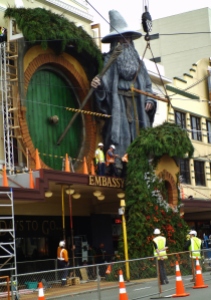
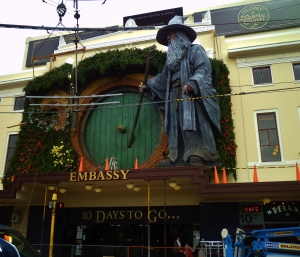
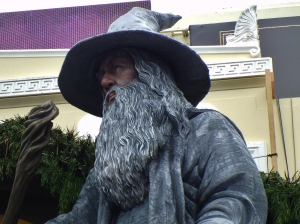
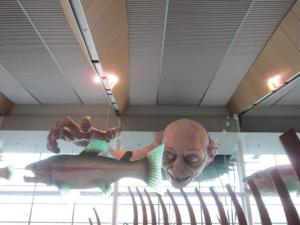


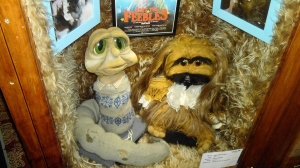
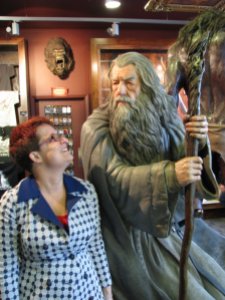
Yeah we will go, just because it is Tolkien, and I too devoured the books. LOTR left me conflicted because the books are brilliant and it is hard to recreate that world. They did a stunning job, although the Hollywood treatment does not do justice to the original text. If it will ease your socialist soul, we will go with you in a sign of solidarity! 🙂
It’s a date! 🙂
I have had some interesting responses to this blog – both from within and outside the film industry – but this one gives the most insight to my two sentence summary of the situation I think. Definitely worth the read!
– Anna
In Australia, a union called the MEAA – Media, Entertainment And Arts Alliance – have been trying to unionize the actors industry in Australia. Led by chairman Simon Whipp, the union became a controversial factor in the Australian film industry because it attempted to get better deals for actors, but at the same time it was chasing away major productions who were coming to Australia because it wasn’t unionized. The most significant casualty of Simon Whipp’s actions in Australia culminated in the cancellation of George Miller’s JUSTICE LEAGUE movie; a film already suffering from the American Writer’s Guild Strike, which was finally closed down due to threats of union action against the production. Whipp’s reputation preceded him everywhere he went from that point as a lot of Australian film workers (NON-actors, i.e. film crew) blame the actions of the MEAA for chasing away a significant portion of American film shoots between 2007 – 2010.
Meanwhile in New Zealand, In 2010, the casting for the first season of the TV show THE ALMIGHTY JOHNSONS is taking place. Run by South Pacific Pictures, headed by the highly experienced and hard-headed producer John Barnett who is known for his cutthroat tactics in trying to keep his company profitable, the show raised eyebrows and the ire of the industry by forcing actors to sign a contractual agreement stipulating pay-scales and rights and essentially leaving any actors who got a part on the show with what could be described as an unfair deal. In short, you couldn’t audition unless you signed the contract and if you signed the contract and got the part, you were bound by the rules of that contract you had to sign in order to audition in the first place. This contract for THE ALMIGHTY JOHNSONS came about because of the pay-disputes that happened during the sixth season renewal of OUTRAGEOUS FORTUNE. The show, starring Robyn Malcolm who would become a spokesperson in the Actors Equity vs The Hobbit case, was cancelled by John Barnett because (when you boil down to it) he didn’t want to meet the demands of the cast for a pay raise (which, according to some reports, the cast had not received during the entire production of the show). To prevent a negotiations breakdown for THE ALMIGHTY JOHNSONS, Barnett created the provision that actors must sign a contract throwing away their rights to ask for more money if the show was renewed for more seasons after the initial one.
At some point in the the ALMIGHTY JOHNSONS scandal, Simon Whipp – who was advising the New Zealand Actor’s Equity (a union-like guild) – became involved in giving direct advise to the group on how to best proceed. As far as we know, no action was taken against THE ALMIGHTY JOHNSONS bar a sternly worded letter of disapproval coming from NZ Actor’s Equity (and even I’m not sure that even that happened).
Then, in September 2010, Simon Whipp advises the NZ Actor’s Equity to enter into a union-negotiated agreement covering all NZ performers on THE HOBBIT. New Zealand law prohibits collective bargaining with any labour organization representing independent contractors and thus Jackson and his company 3 Foot 7 refused to take part in proceedings, stating that it would be illegal. At this same time, Jackson announced that Warner Bros was putting together a special points-pot of money to ensure that NZ actors would receive royalties for the roles they played in THE HOBBIT Trilogy and that creative Hollywood accounting would not rob them of this (as opposed to what happened to both the NZ and international cast of the LORD OF THE RINGS Trilogy). Insider reports suggest that Peter Jackson’s accepting the directorial role in the trilogy (after Guillermo Del Toro left) was hinging on many conditions, of which this special actor’s points pot was one of the items that the studio had to meet. Jackson also assured that actors, including background extras, would be paid in according to the Blue and Pink Books – a set of pay guidelines for the NZ film industry setup by the various guilds including actors, directors, producers and technical crew. The Blue and Pink Books are not law, but many productions who shoot in NZ honor the pay rates suggested in these books and are deemed to be fair and equitable by all including NZ Actor’s Equity….at least UNTIL the protests started.In response to Jackon and 3 Foot 7’s refusal to violate NZ labour laws and enter into negotiations, Simon Whipp and the MEAA issued a statement out to all the Actor’s Guilds of the world calling for solidarity in boycotting The Hobbit until the company met with NZ Actor’s Equity. This is when the story broke across the world because the American Screen Actor’s Guild (SAG) issued a meaningless and powerless statement threatening that they would force their actors (such as Sir Ian McKellan) from taking part in the film because it was ‘non-union’ (even though SAG actually can’t do this because NZ’s labour laws are in favor of Warners and Jackson). Interviews and threats and protest marches started. Among the things going on behind the scenes were comments made by NZ producers that SAG’s statement was in fact an attempt to fan the flames against NZ because SAG does not support ‘runaway productions’ i.e. American films being shot and casted outside the continental United States where SAG has no legal jurisdiction i.e. it is in SAG’s best interests that THE HOBBIT leave NZ and be shot in a sound-stage in Hollywood, so their support of NZ Actor’s Equity seemed very strange. At the same time the NZ Techos Guild (film crew guild) turned against NZ Actor’s Equity because they refused to consult with the other guilds before taking protest action, the WETA Workshop marched in protest against Actor’s Equity as did many New Zealanders who now saw the whole industry endangered by the actions of the actors’ guild being led by the man who was already hated by half the industry in Australia.
At the height of this frenzy, Warner Bros decided to take advantage of the chaos by issuing a memo to Jackson and Company to start quoting the price for moving production to Eastern Europe and London. Jackson and Richard Taylor decided that it was best for the public to know of this and, after getting the okay from Warners, released this information which sparked the public outrage and turned the country against the NZ Actor’s Equity. The government was eventually forced to step in and alter NZ labour laws to appease the studio in order to ensure that THE HOBBIT remained filming in NZ.
There are some things to keep in mind about this issue:
1) It IS in the interest of a production company that the labour laws were clarified to ensure that a contractor cannot be counted as an employee and thus recieves none of the benefits that an employee does for a production or a business. Historically, WETA Workshop and Wingnut had to fight a couple of disgruntled employees in court and had lost their cases, being forced to pay out compensation for the dismissal of those two employees. Now that the law has been changed, these court cases will not happen. In this sense, it is definitely to Peter Jackson’s benefit that these laws were changed.
2) It IS an almost certainty that Warner Bros saw the chaos created in this dispute as an opportunity to swoop in and protect themselves legally as well as blackmail the NZ government for more money for their own ends. It is likely that Jackson could see this happening and allowed it to happen. The argument is that what incentive is there for Jackson to fight his bosses, especially since he had worked so hard to try and get a fairer deal on THE HOBBIT for NZ actors. 3) Conspiracy theorists like to paint Peter Jackson as the mastermind of this operation as a means to try and short-change/sell-out NZers. This is, for the most part, a strange suggestion since if the NZ Actor’s Equity hadn’t bothered to attack the production, the opportunity for Warners to put NZ under its thumb would never have arisen.
4) Something to think about: why did Simon Whipp and the NZ Actor’s Equity attack THE HOBBIT out of all the productions happening in NZ? Why did they not attack John Barnett and South Pacific Pictures. The answer is fairly obvious: John Barnett produces anywhere from 4 – 7 major television shows a year plus 1-4 feature films per year. He is one of NZ’s largest, busiest and most prolific employers of actors in the NZ film and television industry. Peter Jackson, on the other hand, only produces a movie every couple of years or so. If members of the NZ Actor’s Equity got into the ‘bad books’ of Peter Jackson, what harm would that do? Very little, since most actors pretty much accept they won’t ever be starring in a Peter Jackson film. But getting into the bad books of John Barnett and South Pacific Pictures would be professional suicide. It seems apparent that Whipp told NZ Actor’s Equity to target the biggest target that would create the least damage for the acting community if they lost, but clearly they never entertained the notion that they would create a situation that would spell EVERYONE (producers, directors, actors, crew) losing substantial labour rights because of their actions.
5) On 26 October 2010, former Equity director, Simon Whipp, appeared on CAMPBELL LIVE and said “If we have known that production wouldn’t meet with us we would not have gone down this track. But how would we have known that the production company would not agree to meet?” Whipp was also quoted as saying that he would feel no guilt if the Hobbit ended up being made elsewhere.
6) Some said that Warners had no intention of moving the production to Europe. Although this will never be fully answered, it is worth noting that WETA Workshop had managed to pack 1/3rd of their HOBBIT props and sets into shipping containers by the time the dispute had ended and most of their technicians had already booked flights and hotels; so if this was a ‘fake-out’ then it still cost Warners a fair bit of extra money to ‘go through with the motions’. Producers and location managers had already arrived in the Czech Republic and were scouting for locations via helicopter during this entire period.
At the end of the day, many non-actors who were aware of both sides of the war and were able to understand the larger picture of what was going on, feel that something terrible had happened to New Zealand as a whole because the NZ Actor’s Equity acted in a selfish manner. Because they were too afraid to take on the real people in the NZ film industry who were exploiting the rights and livelihoods of actors, they created a rift which allowed for a major American corporation to pry the wedge further apart and then extort NZ for money to fix the problem. Peter Jackson and Wingnut Films have been, historically, very good employers who paid their contracters equitably — despite the money issues that plagued LORD OF THE RINGS because of New Line’s ‘cooked books’. However many feel that NZ Actor’s Equity targeted Jackson because they felt they had nothing to lose and everything to gain from their actions. NZ Actor’s Equity never consulted the NZ Techos Guild, or the NZ Director’s Guild, or SPADA (the producer’s guild) before taking action even though the ramifications of what happened has affected everyone in these guilds, many of whom no longer trust the NZ Actor’s Equity leadership or their decision making abilities. The NZ Actor’s Equity also failed to see that they could not win a battle against such a major corporation, particularly since the man who was leading them was more than happy to see THE HOBBIT and other US productions leave NZ shores forever instead of trying to actually create a better working environment for everyone involved. Some conspiracy theorists have even accused Simon Whipp of trying to destroy the NZ film industry in the hopes of attracting overseas productions back to Australia which the MEAA would then handle any union-negotiations for their performers.
Many in the NZ film industry have forgiven the actors who took part in the boycott, out of good-will and out of the realization that most members of NZ Actor’s Equity were unable to see what their actions would do even though some producers and members of the Techos Guild had warned them. It is a reality that actors exist in many worlds; film, television, theater and other services, thus will never have the macro-level of understanding of the politics of filmmaking as film crews and producers may have. However, this has been a sober reminder that the NZ small-country mentality of ‘doing the right thing’ will not win a battle against a major multinational corporation with incredible powers and a cold-hearted ability to take advantage of any situation for their benefit if you allow them to do so. As filmmaker Jonathan King said, it was the equivalent of sheep making a deal with wolves to chase away the shepherd that had cared for them all this time.
Even if Peter Jackson was the mastermind of this elaborate charade, he still needed the actors to create the situation for him to take advantage of and this was despite the fact that he fought long and hard to ensure that THE HOBBIT Trilogy was going to be one of the best-paid productions for NZ actors in our country’s history.
From the horse’s mouth – here are a couple of interviews Peter Jackson did today. I still think film workers should be able to negotiate a collective agreement if they want to, but it looks like that’s a whole other legal battle.
http://www.stuff.co.nz/entertainment/film/8002142/Misunderstanding-in-Hobbit-spat
http://www.radionz.co.nz/national/programmes/morningreport/audio/2539765/peter-jackson-speaks-to-morning-report.asx